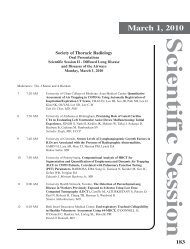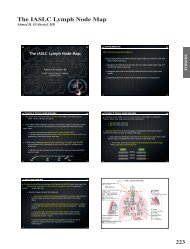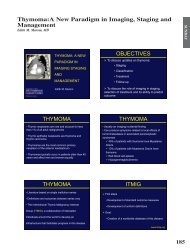Thoracic Imaging 2003 - Society of Thoracic Radiology
Thoracic Imaging 2003 - Society of Thoracic Radiology
Thoracic Imaging 2003 - Society of Thoracic Radiology
Create successful ePaper yourself
Turn your PDF publications into a flip-book with our unique Google optimized e-Paper software.
MONDAY<br />
106<br />
Pulmonary Regurgitation<br />
Pulmonary valvular regurgitation usually results from severe<br />
pulmonary arterial hypertension. Less common causes include<br />
infectious endocarditis, carcinoid and syphilis. Chest radiograph<br />
and cross-sectional imaging shows findings <strong>of</strong> pulmonary<br />
arterial hypertension with enlargement <strong>of</strong> the central<br />
pulmonary arteries and dilatation <strong>of</strong> the right ventricle.<br />
Tricuspid Stenosis<br />
An uncommon lesion, tricuspid stenosis is usually associated<br />
with rheumatic heart disease and mitral stenosis. Carcinoid syndrome<br />
can cause tricuspid stenosis, in which case the pulmonary<br />
valve is usually involved, and typically there is a degree <strong>of</strong> tricuspid<br />
insufficiency. Prevalvular lesions such as right atrial<br />
myxoma and extension <strong>of</strong> renal cell carcinoma into the inferior<br />
vena cava and right atrium can also cause right atrial outflow<br />
obstruction. Patients typically present with fatigue due to<br />
decreased cardiac output, and symptoms <strong>of</strong> systemic venous<br />
hypertension such as hepatomegaly, ascites and peripheral<br />
edema. Chest radiograph and cross-sectional images will show<br />
signs <strong>of</strong> elevated systemic venous pressure with enlargement <strong>of</strong><br />
the vena cavae, azygos vein and dilatation <strong>of</strong> the right atrium.<br />
Tricuspid Regurgitation<br />
In the majority <strong>of</strong> cases, tricuspid regurgitation is a result <strong>of</strong><br />
right ventricular failure with dilatation <strong>of</strong> the tricuspid annulus.<br />
Less common causes include carcinoid tumor, infectious endocarditis,<br />
particularly in drug abusers, and rupture <strong>of</strong> the papillary<br />
muscle. If pulmonary venous hypertension is not present, tricuspid<br />
regurgitation may be well tolerated. If pulmonary<br />
venous hypertension is present, such as in patients with mitral<br />
valve disease, patients with tricuspid regurgitation develop<br />
symptoms <strong>of</strong> systemic venous hypertension. The chest radiograph<br />
and cross-sectional imaging will show right heart<br />
enlargement and dilatation <strong>of</strong> the azygos vein and vena cavae.<br />
CT scan with intravenous contrast may show reflux <strong>of</strong> contrast<br />
into the hepatic veins.<br />
REFERENCES<br />
Elliott LP. Cardiac imaging in infants, children and adults.<br />
Philadelphia, 1991, JB Lippincott<br />
Lester SJ, Heilbron B, Gin K, et al. The natural history and rate<br />
<strong>of</strong> progression <strong>of</strong> aortic stenosis. Chest 1998; 113:1109-1114<br />
Lippert JA, White CS, Mason AC, Plotnick GD. Calcification <strong>of</strong><br />
aortic valve detected incidentally on CT scans: Prevalence<br />
and clinical significance. Am J Roentgenol 1995; 164:73-77<br />
Lipton MJ, Coulden R. Valvular heart disease. Radiol Clin N Am<br />
1999; 37:319-339<br />
Miller SW. Cardiac <strong>Radiology</strong>. St. Louis, 1996, Mosby-Year Book<br />
Sabet HY, Edwards WD. Tazelaar HD, Daly RC. Congenitally<br />
bicuspid aortic valves: A surgical pathology study <strong>of</strong> 542<br />
cases and a literature review <strong>of</strong> 2,715 additional cases. Mayo<br />
Clin Proc 1999; 74:14-26<br />
Schnyder PA, Sarraj AM, Duvoisin BE, et al. Pulmonary edema<br />
associated with mitral regurgitation: Prevalence <strong>of</strong> predominant<br />
involvement <strong>of</strong> the right upper lobe. Am J Roentgenol<br />
1993; 161:33-36<br />
Sorgato A, Faggiano P, Aurigemma GP, et al. Ventricular arrhythmias<br />
in adult aortic stenosis: Prevalence, mechanisms and<br />
clinical relevance. Chest 1998; 113:482-491







